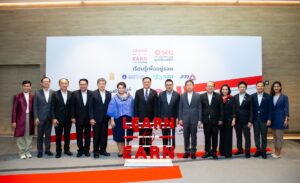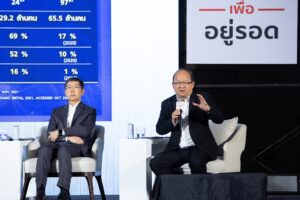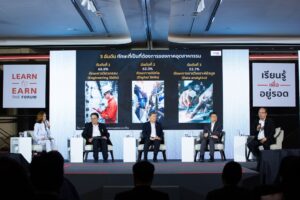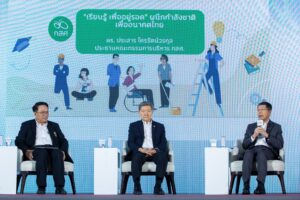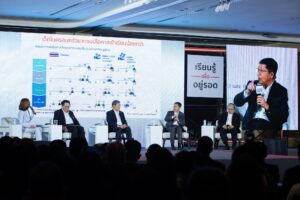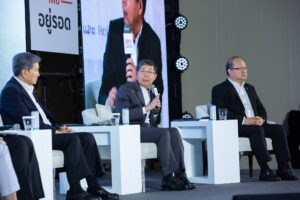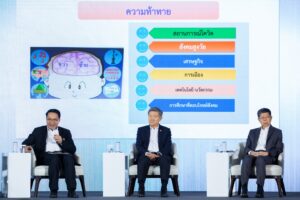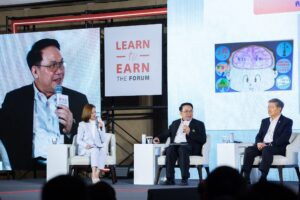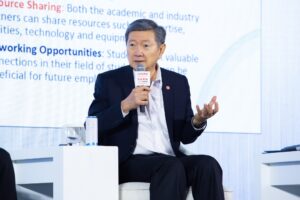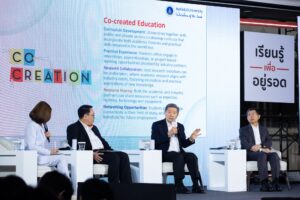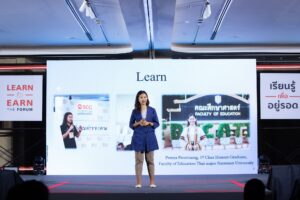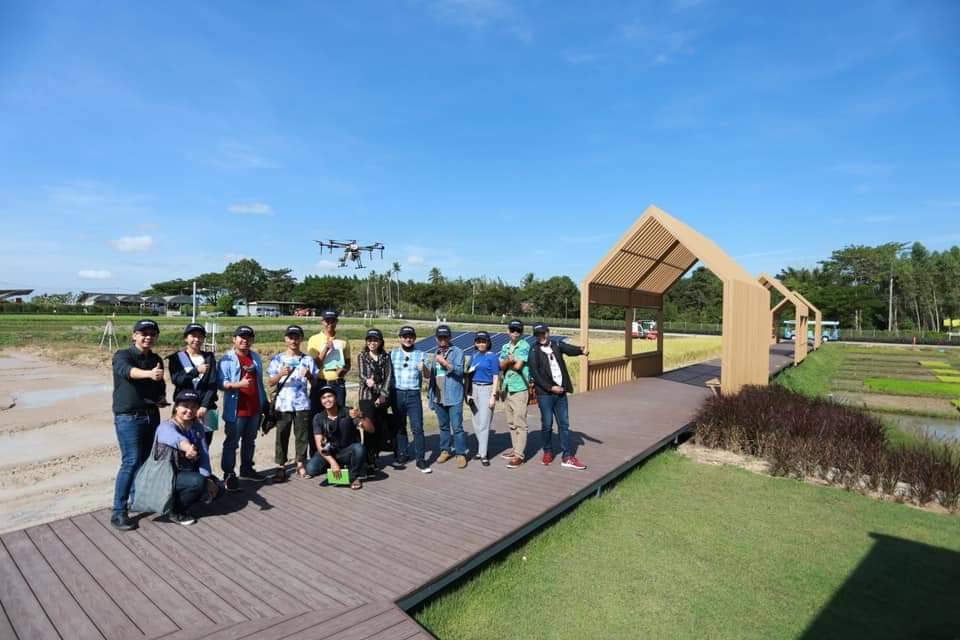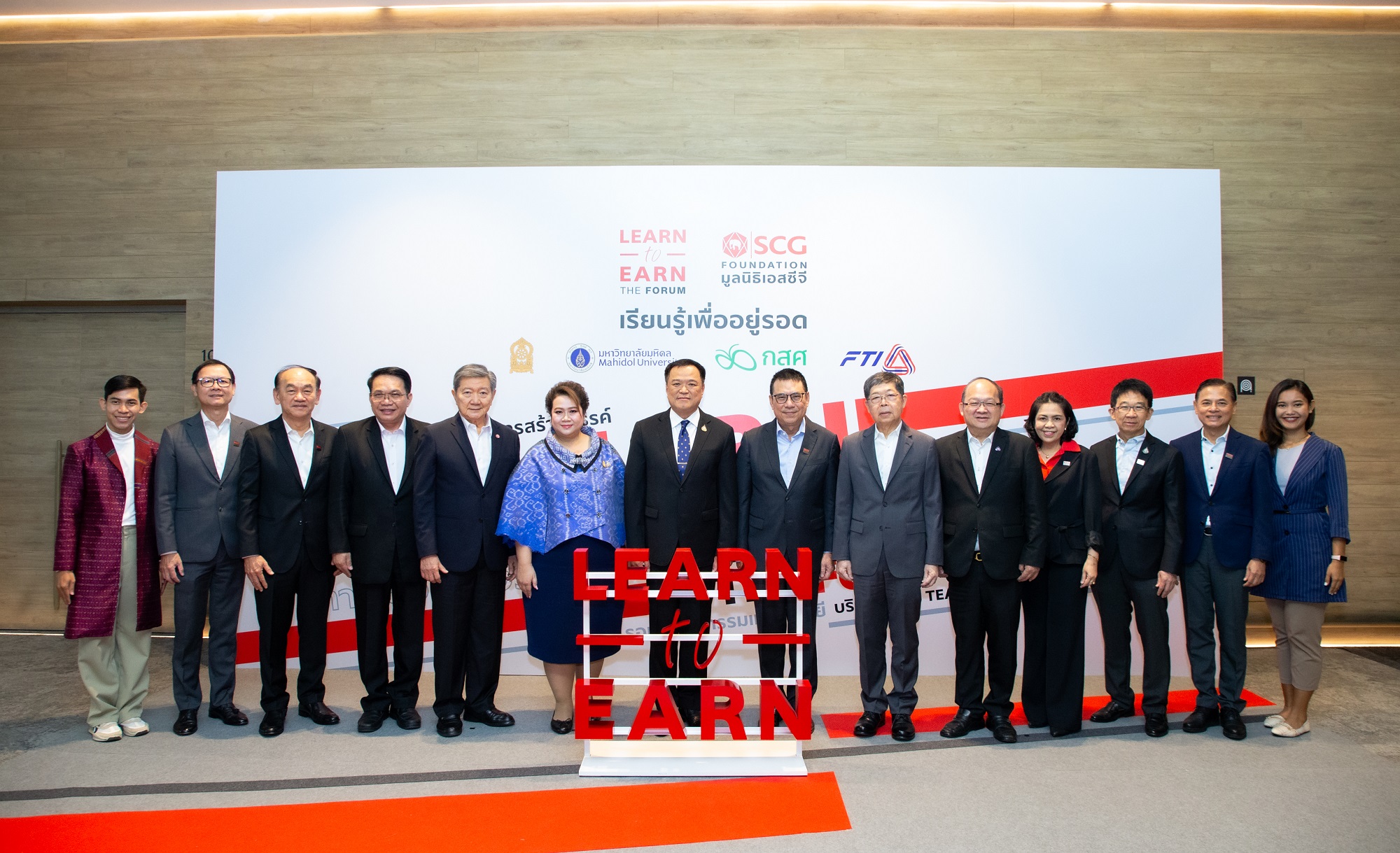
The SCG Foundation has continued its efforts to decrease inequality in society by supporting children and members of the youth with scholarships for the past 60 years. At present, the foundation has granted over 100,000 scholarships, with most of them emphasizing education that addresses demand in the labor market. These include scholarships in fields such as medicine and public health, with jobs like nurse’s assistants, and dental assistants, in other fields like industry, particularly in S-curve and New S-curve industry, as well as Information Technology. These efforts are carried out to publicize the Learn to Earn concept, which promotes using education to survive and thrive in an ever-changing world. In its latest development, the SCG Foundation recently held “Learn to Earn: The Forum” to Ignite New Perspectives Among the Youth, a forum for youth members to learn ways to adjust and increase their skills and knowledge, namely in terms of soft and hard skills. The objective of the event was to increase awareness of ways that the youth can thrive in a constantly changing environment and workforce. It was carried out by representatives from both the public and private sectors, with the event featuring 4 Key Drivers in the country, to share their ideas and perspectives on the subject of “Learning to Survive” for Thailand’s Future.” The ideas placed massive importance on developing potential in individuals from all walks, and promoting lifelong learning to result in tangible steps for real-world execution, which will result in sustainable benefits for all individuals.
Mr. Kriengkrai Thiennukul, Chairman of the Federation of Thai Industries (FTI), shared during the event that the rapid changes we see in the world today have resulted in a direct impact on the industry sector. One such Digital Transformation, as well as a present lack of workers, the latter of which has resulted from an aging society. He added that the only way Thailand can push through these changes is to shift their people into highly skilled labor workers, who are much more in demand in the market. Another suggestion is to focus more on innovation and research work that can solve real-world issues. He also said that the Thai industry scene has shifted to a Next-Generation industry that supports S-curve and New S-curve industry variants. Thus, the most desired skills in these areas are engineering, digital skills, and data analysis.
Dr. Prasarn Trairatvorakul, Chair of the Board of Governance of the Equitable Education Fund (EEF), shared that the solution to the education problem in young children and youth members starts with understanding that there are both groups of students that are still in the system, and those who have already exited the system. For the group that is still in the educational system, it can be apparent that the curricula they are being exposed to do not reflect the working skills required in the modern market. This often results in unemployment. As for the group that has exited the system, he added that these individuals must develop valuable work skills to ensure they are always employed, which he agrees with short-term, career-based learning courses that take 1 year to complete. Such programs guarantee working opportunities after graduation, such as dentist’s or nurse’s assistant programs, both of which are currently in high demand. He also shared that for the management of education among children and youth members, particularly those who have left the system, concerned bodies should encourage them to re-enter the education system. However, if they are unable to bring them back, there needs to be ample opportunities for them to learn even though they have left the traditional system.
Clinical Professor Piyasakol Sakolsatayadorn, M.D, President of the Mahidol University Council and Former Minister of Public Health, shared that he believes in encouraging learning to happen anywhere. Several learning institutions are already currently promoting micro credential-based programs, which do not require a long learning duration, and focus more on fulfilling labor market demand. Aside from increasing their chances of being employed, individuals who go through these programs will gain valuable knowledge that can be developed through higher studies. He added that aside from technological skills, critical thinking skills, management skills, and leadership skills, the labor market is also looking for language and communication skills. Personally, he believes that new programs have to be drafted in collaboration with learning institutions and concerned organizations, to ensure that each program truly fits demand in the labor market. He also added that the most suitable programs to tackle the current changes in the market are those that cross between fields of expertise. Combining multiple fields is more suitable for students to broaden their horizons and will be more beneficial, compared to traditional learning methods.
Dr. Phichet Phophakdee, Deputy Permanent Secretary of the Ministry of Education Thailand, shared that the main issue we currently face is a mismatch in the production of workers and the kind of workers needed in the market. The Ministry of Education is thus actively working to change this, and is emphasizing learning anytime and anywhere, to speed up the introduction of skilled workers to fit market demand. These efforts also help address the present issue of Thailand’s aging society. The Ministry is working with the FTI to understand the current demands in the labor market, so that it may develop more curricula that reflect these requirements. He added that this has resulted in multiple new programs, which have been met with positive reactions from students, with many of them finding ways to earn while they are studying. Such examples include e-sports programs. The Ministry has also been collaborating with other concerned organizations to promote lifelong learning, he said.
Ms. Preeya Promdaeng, a scholar under the SCG Foundation, believes that the main factor that has led her to this present point of success is an undying belief to keep developing. Driven by a passion to become a teacher, Ms. Preeya wants to pass opportunities and new ideas on to children of the next generation. After receiving first-class honors from her alma mater at the Faculty of Education, Naresuan University, she applied for a teaching position at King’s College International School Bangkok. Even though she majored in the Thai language, she diligently practiced English as something she enjoyed, also sparing some time to study Bahasa Indonesia. At present, she is currently studying German. She added that most of her free time away from teaching is spent finding more opportunities to upgrade her skill set, by reading, consuming media, or participating in activities or contests to expand her perspective and test her current skills. She also partakes in “re-skilling” which refers to putting the things she learns into practice, such as all the languages she has collected, namely Thai, English, and Bahasa Indonesia, as well as other skills that are vital to daily life, such as problem-solving, analytical skills, and general life skills. She also believes in adaptation as a valuable skill, because no matter where a person is, as long as they learn how to adapt to an organization, their lives will become more valuable and purposeful. As for the Learn to Earn concept, Ms. Preeya shared that the mindset is mostly about practicing and developing the skills one is talented at or has an avid interest in, so that these skills can turn into career choices. This begins with adding value to one’s self by upgrading skills, and re-skilling to maintain that value or to improve skills that can be used in the workplace. Once they achieve this, students will truly be able to Earn from Learning happily and sustainably.
The SCG Foundation believes that the quality of human resources is of the utmost importance. If a country wants to develop effectively, the foundation starts with developing people, both in terms of developing their skills and instilling a lifelong learning mindset within them. These factors are no less important than the mandatory education most individuals need to pass through. Aside from these developments, true growth can only be achieved with active collaboration from all concerned parties, to ensure positive long-term effects for society, and to push the country forward into rapid growth. To stay updated on news from the SCG Foundation, visit www.scgfoundation.org and the “LEARNtoEARN” Facebook page.
